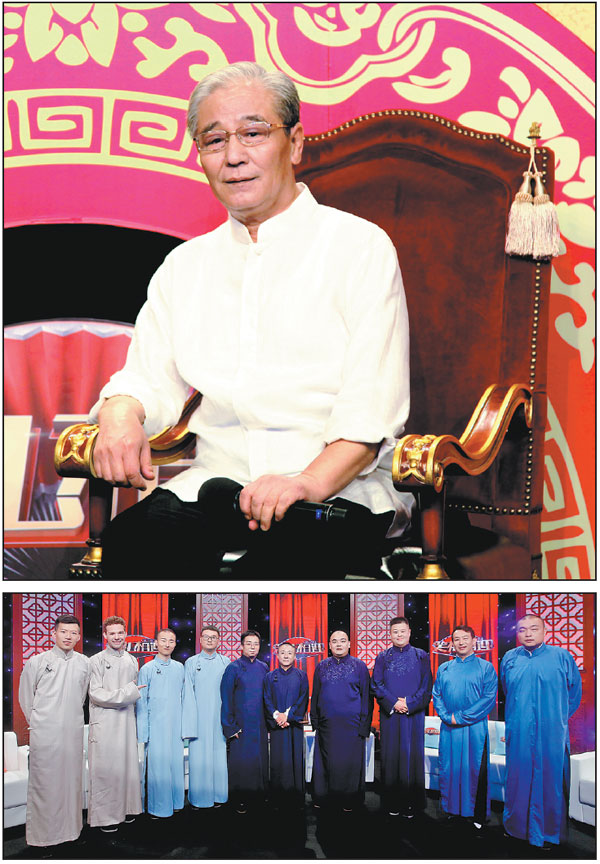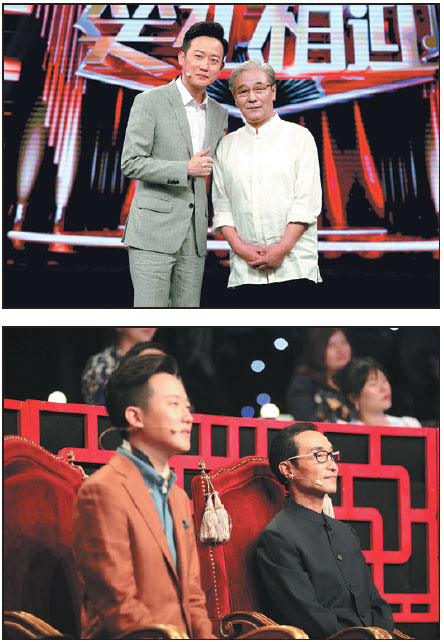Gift of the cross talk gab
When a budding Peking Opera actor was told he lacked the voice to have any future in the art, he looked back on his childhood years as he sought to use his voice in a different way
It seems that Ma Zhiming was born with xiangsheng surging through his veins.
"It was so natural to me that it was just like breathing," says Ma, 74, whose father was Ma Sanli (1914-2003), one of the most famous exponents of the art, a traditional form of performing comedy. Xiangsheng, literally face and talk, is generally known as crosstalk.
Perhaps predictably, one of the things Ma Zhiming eventually liked doing most after school was watching xiangsheng shows. One thing he enjoyed in particular was observing members of the audience left in stitches as the xiansheng team plied them with gags throughout the evening.

|
From top: Ma Zhiming; crosstalk performers from the third season of Tianjin Satellite TV reality show Laugh Out Loud; Ma Zhiming (right) with the host of the show. |
"At home I watched (family members) writing scripts, practicing and rehearsing for the performances. At the theater, I followed from the backstage to the stage."
Ma Sanli retired when he was 87 and two years later died of cancer. Ma Zhiming's grandfather, Ma Delu, was dubbed one of the eight distinguished xiangsheng masters of his generation. The Ma family's ties with xiangsheng went back to the Qing Dynasty (1644-1911).
Xiangsheng was first staged in Beijing in 1862, when the performers began to appear and attract audiences at the Tianqiao area of the capital. Tianqiao was a place where street artists gathered and performed a variety of shows, such as acrobatics, Peking Opera and pingshu, a traditional Chinese art form of storytelling.

Xiangsheng performances usually involve two performers clad in traditional long robes, standing behind a wooden table and engaging in witty banter, though there are also solos, trios or groups. The chief topic of their humorous conversations is familiar issues, including troubled family relationships, and the aim is not only to entertain but also to educate. The xiangsheng performer's larder is deep, holding allusions, innuendo, puns, songs, tongue twisters, and rich helpings of fantasy.
Beijing and Tianjin have been the two most important centers for xiangsheng, the capital giving birth to such great exponents as Hou Baolin (1917-93), and Tianjin being home to masters like Ma Sanli. Because of the proximity of the two cities, performers have frequently compared and exchanged techniques and styles, as well as having a common audience base.
As for Ma Zhiming, despite his love for xiangsheng, his dreams turned to another performing art, Peking Opera, and he enrolled to study it in Tianjin when he was 12 years old, in 1957.
That decision to turn away from xiangsheng was made all the easier in that his father, who had seven other children, did not want to train any of his children to become a xiangsheng performer, because its performers were almost always from poor backgrounds, and he wanted something better for his progeny.
As with Peking Opera, the training for xiangsheng is highly disciplined and harsh. Young comedians studied under a xiangsheng master for at least three years and performed with the teacher to gain experience of mastering the techniques onstage and of communicating with the audiences before striking out on their own. The basic skills of xiangsheng include shuo (talking), xue (imitating), dou (teasing) and chang (singing).
Five years after Ma Zhiming took up Peking Opera, one of his teachers broke the news to him that there was no way that he would ever become a leading player because his voice simply was not good enough.
"Why not learn xiangsheng from your father?" the teacher asked. "With Ma Sanli's background surely you'd have a smooth path?"
Ma Zhiming replied: "I do love xiangsheng but my father taught me nothing about it. He wanted his children to be independent and make a living on their own. I picked up what I knew about xiangsheng just by observing and imitating those doing it."
Recognizing his son's obvious passion for xiangsheng and his ability to retain and recite complicated lines, Ma Sanli agreed and let him work at Tianjin Traditional Folk Arts Troupe, home to many great performers, and Ma Zhiming would become an apprentice to Zhu Kuoquan, who had taught Hou Baolin. Soon, at the age of 17, Ma Zhiming would make his stage debut as a xiangsheng performer.
"Comedy is extremely hard," Ma Zhiming says. "With xiangsheng you've got only two performers on stage trying with their dialogue to get everybody to laugh. I've seen many different kinds of laugher in audiences, such as belly laughs, chuckles and an occasional guffaw, each of which performers interpret in a distinctly different way."
In 1970, in the midst of the "cultural revolution" (1966-76) Ma Sanli and his family were sent to a village in the suburbs of Tianjin and did not return home until 1977.
For the family the forced move was all the more severe because both Ma Sanli and Ma Zhiming had no opportunity to perform xiangsheng. However, it was during those seven years that the father was able to tell his son a tremendous amount about his life as a xiangsheng performer, an invaluable learning experience for Ma Zhiming.
"He showed me the magic of xiangsheng, such as how to create a xiangsheng piece, how to draw inspiration from your daily life in performing xiangsheng, and how to improvise on stage. With certain words a master can get people to laugh, whereas a student performer using exactly the same words completely misses the mark."
In 2017 Ma Zhiming celebrated his 60th anniversary as a xiangsheng performer and then withdrew from the limelight.
He made a rare appearance during a reality show produced by Tianjin Satellite TV, titled Laugh Out Loud, which presents the history of xiangsheng and promotes young xiangsheng comedians.
The producer, Liu Yang, says the first season of the show paid tribute to older xiangsheng masters, and the second one, which premiered on Oct 6, focused on younger performers.
Through competitions and joined by veteran comedians such as Ma Zhiming, Gong Hanlin and Guo Donglin, the 13-episode series brings together about 40 groups of xiangsheng performers from cities including: Beijing; Tianjin; Shijiazhuang, Hebei province; Xi'an, Shaanxi; and Hangzhou, Zhejiang.
"We spent more than a year seeking out xiangsheng comedians who perform at teahouses and clubs across the country," Liu says. "All are less than 40 years old, the youngest in their early 20s. We're keen to show how vibrant this traditional art form is."
The repertoires range from traditional works to works that are right up with the times, he says.
Two of the performers in the show, Ma Jun and Sheng Wei, graduated from the Northern Traditional Folk Arts School in Tianjin and became partners in 2009. In Laugh Out Loud they performed original pieces such as Two Brothers.
"Xiangsheng is a very contemporary performing art, and we pay a lot of attention to creating new stuff and injecting fresh elements into traditional works," says Sheng Wei, who began studying at the Northern Traditional Folk Arts School in 2004 and graduated in 2010.
"We start by coming up with an idea and then write the script together. We keep on revising the piece as we perform it onstage and observe the audience reaction. A piece is complete only once you've revised it at least 100 times."
The worst experience for a xiangsheng performer, Sheng says, is when the punch line is delivered "and absolutely no one laughs".
"It's tough at the start for all xiangsheng performers. We've all had the most embarrassing moments onstage."
Like many other young people, Sheng listens to pop music, watches Hollywood blockbusters and is often online.
"Modern people are often under much pressure and need to relax. Of all the ways of entertainment, xiangsheng is old yet evolving. Anything you see could be your inspiration."
In the 1980s xiangsheng even reached audiences beyond native Chinese speakers. Mark Rowswell, a Canadian better known as Dashan among Chinese, and who speaks impeccable Mandarin, began studying xiangsheng under the tutorship of Jiang Kun, a well-known exponent of the art.
There have been times, such as in the early 1990s, when xiangsheng, like many other traditional Chinese art forms, seemed to be on the brink of extinction, threatened by other contemporary entertainment, but thankfully it has lived on to see better days.
chennan@chinadaily.com.cn

|
From left: Gong Hanlin; Ma Jun (right) and Sheng Wei; Guo Donglin. Photos Provided to China Daily |
(China Daily Global 11/27/2019 page15)




















